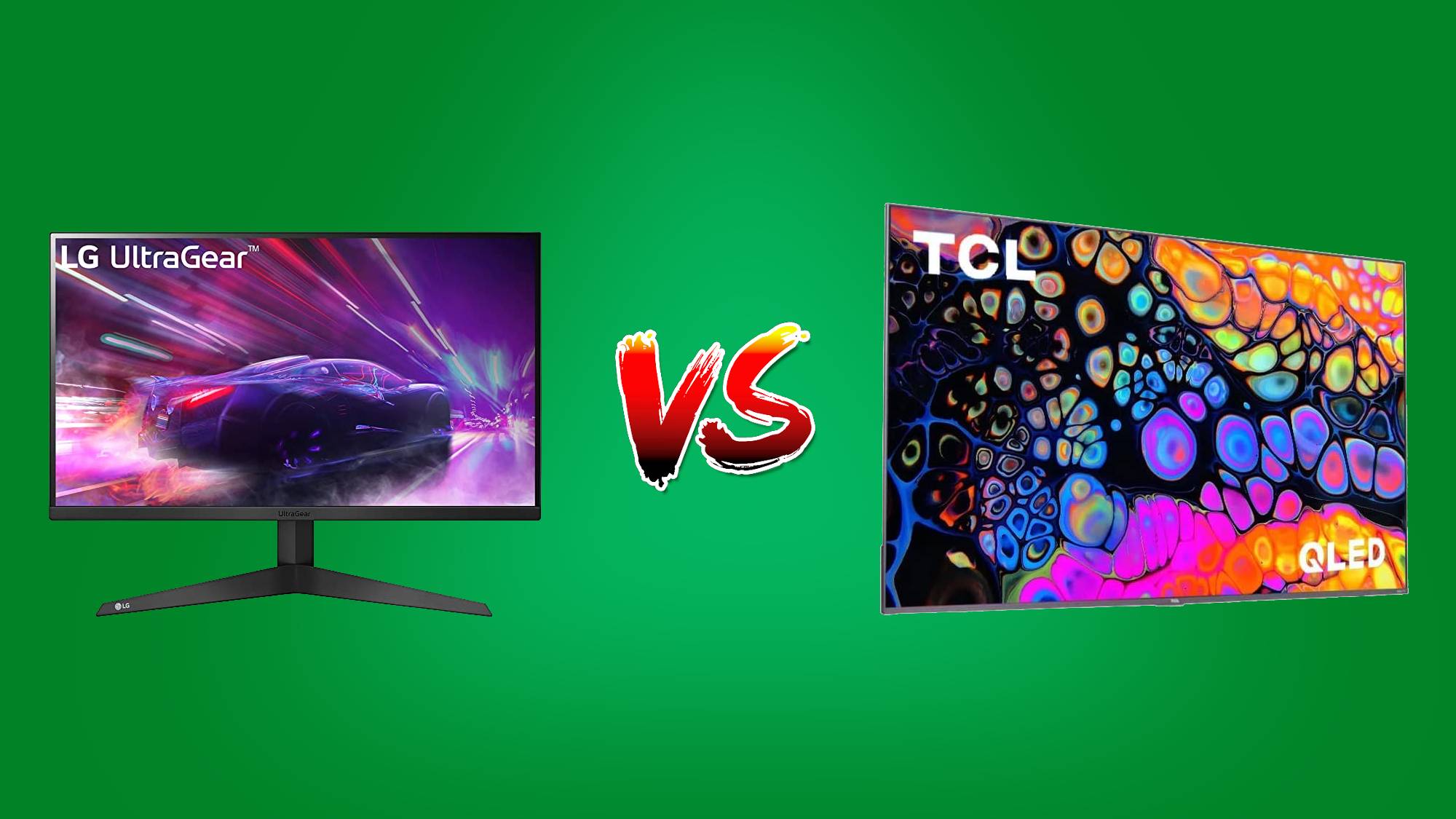Gaming monitor vs gaming TV: which is the better home gaming experience?
We look at the gaming monitor vs gaming TV and find which is best

Sign up for breaking news, reviews, opinion, top tech deals, and more.
You are now subscribed
Your newsletter sign-up was successful
As games become more technologically advanced and slowly force both console and PC gamers to upgrade their specs, it’s essential to ensure that your screen setup supports your beefed-up PC as well as the features that PC games themselves support.
There are two types of screens we'd suggest you get for your PC or console, either the best gaming monitor or the best gaming TV you can budget for. The former is the standard setup and what’s most popular for PC gaming. The latter has been growing in popularity recently due to the comfort level of gaming from your couch and the innate resolution support.
But which option works best for you? If you’re getting the best gaming PC or console to play the best PC games or console titles, then you need to carefully choose the best screen for it. By examining three main factors — price, specs, and performance — this guide will break down the advantages and disadvantages of each option, and from that present the best overall choice for your gaming style.
Gaming monitor vs gaming TV: Price

- Gaming monitors start out much cheaper
- High-end gaming monitors and TVs can be equally expensive
The first factor to consider is pricing, especially in this more budget-conscious time when the cost of tech is an important part of any buying process. This extends to both gaming monitors and gaming TVs, as the price differences can be massive and those looking to buy either should know what to expect before beginning the search.
If you’re on a strict budget, then gaming monitors are going to be your best pick for that reason alone. While there are definitely more premium options for monitors – like some of the best 4K monitors and especially the best 5K and 8K monitors – that start in the high hundreds and even thousands of dollars, you can easily find a good quality HD one for $300 or less. This is true if you wait for Amazon Prime Day, Black Friday monitor deals, or other similar sales events.
However, gaming TVs are extremely expensive as they start in the thousands and continue to climb upward in price the more gaming features are included and the larger the size. And it seems the refresh rate doesn’t impact that price much either. TVs that are meant for console gaming have lower refresh rates generally, but are still well above a thousand dollars.
If you have plenty of money to spare, then either option is perfectly fine and it would simply depend on other factors like aesthetics or specs. But those who have a strict price ceiling should stick to gaming monitors.
Sign up for breaking news, reviews, opinion, top tech deals, and more.
- Winner: Gaming monitors
Gaming monitor vs gaming TV: Specs

- Gaming TVs overall have better specs including image quality
- Gaming monitors have a higher pixel density
Overall, gaming TVs have the edge over gaming monitors in terms of specs, mainly resolution, image quality, and size. Gaming TVs come in 4k as a standard while monitors can vary widely from 1080p, 1440p, and 4k. This makes TVs especially suitable for next-gen console gaming that can really take advantage of these higher resolutions.
TVs also use much better tech like Mini-LED backlights and OLED across the board, while only higher-end monitors possess those features. TVs have generally better image quality as they boast superior color gamut, brightness, and contrast, as well as better HDR performance.
Size is another factor to consider, with TVs running much larger in size meaning that you can comfortably sit further away during a session while still appreciating the image quality. Monitors usually come in smaller sizes, which works well when fitting them on a work desk but becomes an issue of eye strain as the size and resolution increase.
However, gaming monitors have an edge when it comes to sharpness due to higher pixel density, especially compared to TVs which often use chroma subsampling to implement less color information. This difference becomes far more noticeable the closer one sits to the screen, which is why monitors display fine text and interface elements much better than TVs when viewing them close up.
- Winner: gaming TVs
Gaming monitor vs gaming TV: Performance

- Gaming monitors are light-years ahead in terms of refresh rate
- Only recently have gaming TVs started to feature faster response times
This is where gaming monitors shine, as it’s quite easy to find even modestly priced ones with a refresh rate of 144Hz. Higher-end monitors can reach numbers of 240Hz or 360Hz, and ones that can hit 500Hz are incoming. Compared to gaming TVs, in which high-end ones can reach 120Hz but the vast majority still only have 60Hz refresh rates.
Until recently, monitors also reigned supreme in response times, with many models able to hit between 1ms and 5ms while TVs trailed way behind. However, TVs finally improved in tech enough to be able to match monitors, especially those with HDMI 2.1 which all but eliminates input lag.
That said, it’s still important to research TVs ahead of time to see which ones feature less latency, while gaming monitors are a much safer bet that they’ll have superior response times. And often you have to switch to a separate gaming mode in order to get that enhanced performance for TVs, which is another hassle compared to monitors.
- Winner: Gaming monitors
Gaming monitor vs gaming TV: Which should you choose?
Unless you plan on gaming on your couch with a PS5 or Xbox Series X and will be sitting far away from your screen, it’s overall better to invest in a gaming monitor. For those who want a better gaming experience, monitors on average boast better performance and pricing than TVs.
While TVs do generally have superior visuals, monitors are better suited to display sharper images thanks to a higher pixel density which is better for many games that have small text and more interface elements. And on top of that, refresh rates and response times are much better, which is what matters most for most gamers, especially esports players.
Pricing is another strong factor in favor of gaming monitors, as it’s much easier to find quality ones for cheap and the holiday sales tend to be much better. Gaming TVs are still obscenely expensive and sales barely put a dent in them. It’s hard to recommend even the best ones when many buyers are adhering to strict budgets.
- Overall winner: gaming monitors

Named by the CTA as a CES 2023 Media Trailblazer, Allisa is a Computing Staff Writer who covers breaking news and rumors in the computing industry, as well as reviews, hands-on previews, featured articles, and the latest deals and trends. In her spare time you can find her chatting it up on her two podcasts, Megaten Marathon and Combo Chain, as well as playing any JRPGs she can get her hands on.